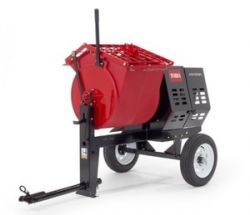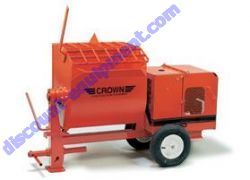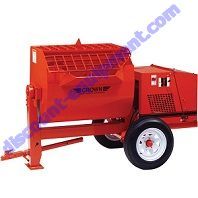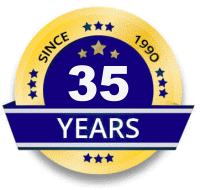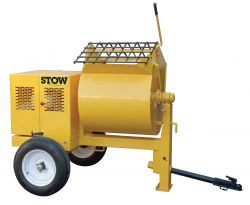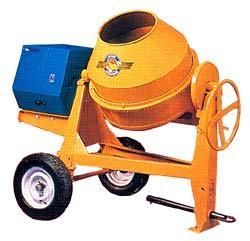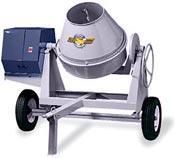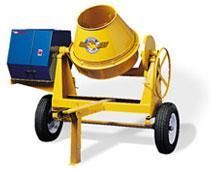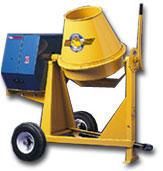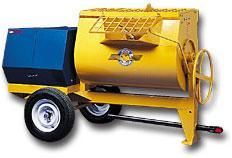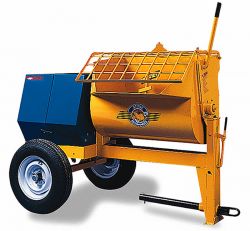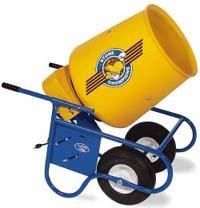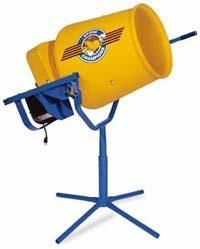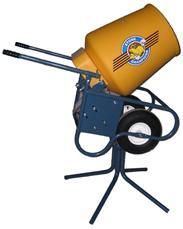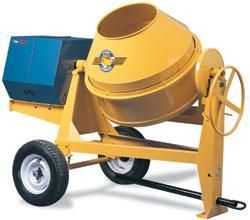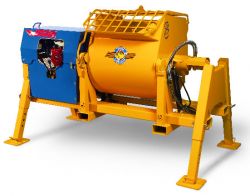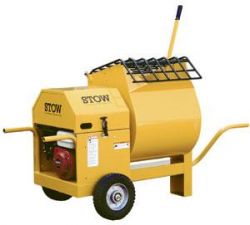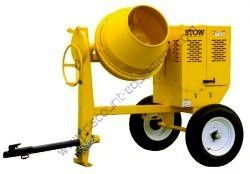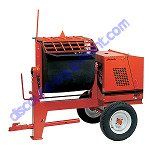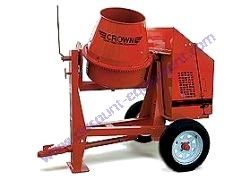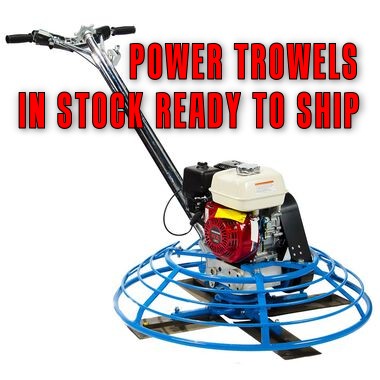Multiquip Whiteman MC64PH5 Concrete Mixer 6cu.ft. Honda 5.5HP, Poly Drum
Safety Information
Multiquip MC64PH5 Concrete Mixer
SAFETY INFORMATION
GENERAL SAFETY
CAUTION
NEVER operate this equipment without proper protective clothing, shatterproof glasses, respiratory protection, hearing protection, steel-toed boots and other protective devices required by the job or city and state regulations.
Avoid wearing jewelry or loose-fitting clothes that may snag on the controls or moving parts as this can cause serious injury.
NEVER operate this equipment when not feeling well due to fatigue, illness or when
on medication.
NEVER operate this equipment under the influence of drugs or alcohol.
ALWAYS clear the work area of any debris, tools, etc. that would constitute a hazard while the equipment is in operation.
ALWAYS check the equipment for loosened threads or bolts before starting.
DO NOT use the equipment for any purpose other than its intended purposes or applications.
NOTICE
This equipment should only be operated by trained and qualified personnel 18 years of age or older.
Whenever necessary, replace nameplate, operation and safety decals when they become difficult to read.
Manufacturer does not assume responsibility for any accident due to equipment modifications. Unauthorized equipment modification will void all warranties.
NEVER use accessories or attachments that are not recommended by Multiquip for this equipment. Damage to the equipment and/or injury to the user may result.
ALWAYS know the location of the nearest fire extinguisher.
ALWAYS know the location of the nearest first aid kit.
ALWAYS know the location of the nearest phone or keep a phone on the job site.
Also, know the phone numbers of the nearest ambulance, doctor and fire department.
This information will be invaluable in the case of an emergency.
MIXER SAFETY
DANGER
NEVER operate the equipment in an explosive atmosphere or near combustible
materials. An explosion or fi re could result causing severe bodily harm or even death.
DO NOT mix flammable or explosive substances.
NEVER place your hands inside the drum while starting or operating this equipment.
NEVER disconnect any emergency or safety devices. These devices are intended for operator safety. Disconnection of these devices can cause severe injury, bodily harm or even death. Disconnection of any of these devices will void all warranties.
Before operating the mixer, ensure that the safety grate is in position and correctly fitted.
CAUTION
NEVER lubricate components or attempt service on a running machine.
NOTICE
ALWAYS keep the machine in proper running condition.
ALWAYS ensure the mixer is on level ground before mixing.
Fix damage to the machine and replace any broken parts immediately.
DO NOT tip the mixer onto the drum mouth when the drum is rotating.
Ensure the drum is rotating while filling and emptying the drum.
ALWAYS store equipment properly when it is not being used. Equipment should be stored in a clean, dry location out of the reach of children and unauthorized personnel.
ALWAYS make sure the mixer is clean of dried materials.
DO NOT allow material to build up inside the drum. Keep the drum, frame and wheels clean. Excess debris can fall off on the highway and/or build up on the frame and
wheels, creating an unbalanced condition leading to premature metal fatigue.
ENGINE SAFETY (GASOLINE MODELS ONLY)
DANGER
Engine fuel exhaust gases contain poisonous carbon monoxide. This gas is colorless and odorless, and can cause death if inhaled.
The engine of this equipment requires an adequate free flow of cooling air. NEVER operate this equipment in any enclosed or narrow area where the free flow
of air is restricted. If the air flow is restricted it will cause injury to people and property and serious damage to the equipment or engine.
WARNING
DO NOT place hands or fingers inside the engine compartment when the engine is running.
NEVER operate the engine with heat shields or guards removed.
Keep fingers, hands, hair and clothing away from all moving parts to prevent injury.
DO NOT remove the engine oil drain plug while the engine is hot. Hot oil will gush out of the oil tank and severely scald any persons in the general area of the mixer.
CAUTION
NEVER touch the hot exhaust manifold, muffler or cylinder. Allow these parts to cool before servicing the equipment.
Make certain the operator knows how to and is capable of turning the engine OFF in case of an emergency
NOTICE
NEVER run the engine without an air filter or with a dirty air filter. Severe engine damage may occur. Service the air filter frequently to prevent engine malfunction.
NEVER tamper with the factory settings of the engine or engine governor. Damage
to the engine or equipment can result if operating in speed ranges above the
maximum allowable.
FUEL SAFETY (GASOLINE MODELS ONLY)
DANGER
DO NOT start the engine near spilled fuel or combustible fluids. Fuel is extremely flammable and its vapors can cause an explosion if ignited.
ALWAYS refuel in a well-ventilated area, away from sparks and open flames.
ALWAYS use extreme caution when working with flammable liquids.
DO NOT fill the fuel tank while the engine is running or hot.
DO NOT overfill the tank, since spilled fuel can ignite if it comes into contact with hot engine parts or sparks from the ignition system.
Store fuel in appropriate containers, in well-ventilated areas and away from sparks and flames.
NEVER use fuel as a cleaning agent.
DO NOT smoke around or near the equipment. Fire or explosion could result from fuel vapors or if fuel is spilled on a hot engine.
GENERATOR SAFETY
If using a generator to power the mixer, refer to the applicable generator manual safety information section.
ELECTRIC MOTOR SAFETY (ELECTRIC MODELS ONLY)
NOTICE
Operate the electric motor only at the specified voltage indicated on the nameplate.
DO NOT spray water onto the electric motor.
ALWAYS disconnect the AC power plug from the power source before moving the mixer.
ALWAYS make sure the ON/OFF switch on the electric motor is in the OFF position
when not in use and before inserting the mixer’s power plug into an AC receptacle.
Power Cord/Cable Safety
DANGER
NEVER let power cords or cables lay in water.
NEVER use damaged or worn cables or cords when connecting the equipment to a generator. Inspect the insulation for cuts.
NEVER grab or touch a live power cord or cable with wet hands. The possibility exists of electrical shock, electrocution or death.
Make sure power cables are securely connected.
Incorrect connections may cause electrical shock and damage to the mixer.
CAUTION
Ensure that cables and cords will not be tripped over or trapped underneath the mixer.
NOTICE
ALWAYS make certain that the proper power or extension cord has been selected for the job.
TRANSPORTING SAFETY
CAUTION
NEVER allow any person or animal to stand underneath the equipment while lifting.
NOTICE
ALWAYS make sure forklift forks are inserted as far as possible into the pockets (if applicable) when lifting the mixer.
ALWAYS shut down the engine before transporting.
NEVER lift the equipment while the engine is running.
Tighten the fuel tank cap securely and close the fuel cock to prevent fuel from spilling.
DO NOT lift the machine to unnecessary heights.
ALWAYS tie down equipment during transport by securing the equipment with rope.
NEVER tip the engine to extreme angles during lifting as this may cause oil to gravitate into the cylinder head, making the engine difficult to start.
TOWING SAFETY
CAUTION
In addition to meeting Department of Transportation
(DOT) safety towing regulations, check your local
county or state safety towing regulations before towing
the mixer.
In order to reduce the possibility of an accident while
transporting the mixer on public roads, ALWAYS make
sure the towing vehicle is mechanically sound and in
good operating condition.
ALWAYS shut down the engine before transporting and
place the fuel valve in the OFF position.
ALWAYS inspect the hitch and coupling for wear. NEVER
tow a mixer with defective hitches, couplings, chains, etc.
Check the tire air pressure on both towing vehicle and
mixer. Mixer tires should be infl ated to 50 psi cold.
Also check the tire tread wear on the vehicle and mixer.
ALWAYS make sure the mixer is equipped with a safety
chain.
ALWAYS properly attach the mixer’s safety chains to
the towing vehicle.
The maximum speed for highway towing is 55 MPH unless
posted otherwise. Recommended off-road towing is not to
exceed 15 MPH or less depending on type of terrain.
Avoid sudden stops and starts. These can cause skidding
or jackknifi ng. Smooth, gradual starts and stops will
improve towing.
Avoid sharp turns to prevent rolling.
The mixer should be adjusted to a level position at all
times when towing.
Raise and lock the mixer wheel stand in the UP position
when towing.
Place chock blocks underneath the mixer wheels to
prevent rolling while parked.
ENVIRONMENTAL SAFETY/DECOMMISSIONING
NOTICE
Decommissioning is a controlled process used to safely retire a piece of equipment that is no longer serviceable.
If the equipment poses an unacceptable and unrepairable safety risk due to wear or damage or is no longer cost effective to maintain (beyond life-cycle reliability) and is to be decommissioned (demolition and dismantlement), follow the rules below.
DO NOT pour waste or oil directly onto the ground, down a drain or into any water source.
Contact your country’s Department of Public Works or a recycling agency in your
area and arrange for proper disposal of any electrical components, waste or oil
associated with this equipment.
When the life cycle of this equipment is over, remove the battery (if equipped) and bring it to an appropriate facility for lead reclamation. Use safety precautions when handling batteries that contain sulfuric acid.
When the life cycle of this equipment is over, it is recommended that the mixer frame and all other metal parts be sent to a recycling center.
Metal recycling involves the collection of metal from discarded products and its transformation into raw materials to use in manufacturing a new product.
Recyclers and manufacturers alike promote the process of recycling metal. Using a metal recycling center promotes energy cost savings.
EMISSIONS INFORMATION
NOTICE
The gasoline engine used in this equipment has been designed to reduce harmful levels of carbon monoxide (CO), hydrocarbons (HC) and nitrogen oxides (NOx)
contained in gasoline exhaust emissions.
This engine has been certified to meet US EPA evaporative emissions requirements in the installed configuration.
Attempting to modify or make adjustments to the engine emission system by unauthorized personnel without proper training could damage the equipment or create an unsafe condition.
Additionally, modifying the fuel system may adversely affect evaporative emissions, resulting in fines or other penalties.
Emission Control Label
The emission control label is an integral part of the emission system and is strictly controlled by regulation(s).
The label must remain with the engine for its entire life.
If a replacement emission label is needed, please contact your authorized engine distributor. | 